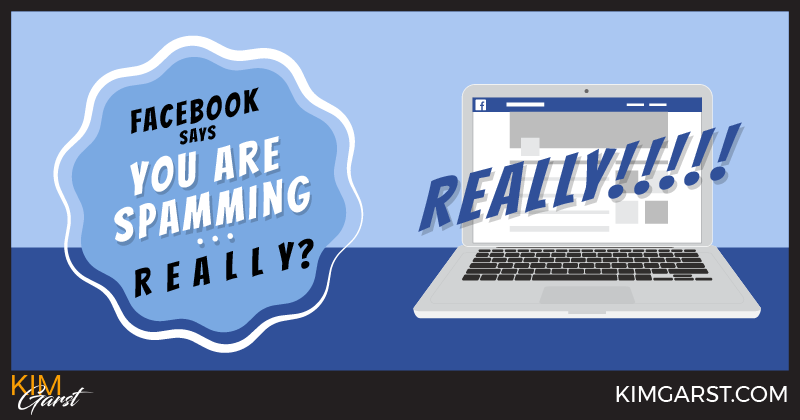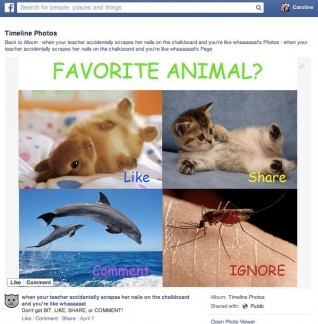Well, Facebook is at it again. Facebook’s newsfeed will soon be undergoing some changes, which you, as a Facebook page owner, need to know about. Keep reading to the end of the post to read my personal views on these latest changes :-), and more importantly, I want to know what you think!
According to a recent Facebook newsroom post, Facebook is introducing these changes with the aim of reducing spam and increasing the visibility of important, relevant stories. They write, “The goal of News Feed is to deliver the right content to the right people at the right time so they don’t miss the stories that are important and relevant to them. Today we are announcing a series of improvements to News Feed to reduce stories that people frequently tell us are spammy and that they don’t want to see. Many of these stories are published by Pages that deliberately try and game News Feed to get more distribution than they normally would.”
Following are the 3 types of behavior Facebook is looking to target.
“Like-Baiting”
You know those posts that are explicitly aimed at getting people to interact with a post? Posts like “Click like if you love sleeping in”, or “Click like if you like pizza, or comment if you prefer lasagna”? This is what’s known as like-baiting (or comment-baiting, share-baiting, etc.)…encouraging others to action by telling them what to do.
We know that when many fans ‘like’ or engage with a particular post, this post will be shown higher up on the newsfeed, and will be shown to more users. But according to Facebook, when they have asked users to rate the quality of ‘like-bait’ stories, fans report a 15% lower relevance than non like-bate stories with the same amount of interaction.
In other words, posts that are explicitly designed to gather likes for the sole purpose of increasing visibility and distribution should not receive more prominent visibility or promotion, and are thus being targeted.
This should not be confused with the best practice of including an appropriate call to action in your post; for instance, asking a question and then explicitly asking your fans to answer the question in the comments.
What you can do to avoid being targeted
This is a pretty easy one to avoid. Do not create posts that have the sole purpose of garnering likes, shares or comments. Your content should be original, useful and aimed at meeting the needs and desires of your audience. To be on the safe side, I would now recommend not explicitly asking your fans to ‘like your posts’; excellent content should garner likes organically anyway.
Frequently Circulated Content
Pages that frequently post already widely circulated content – images and videos in particular – should proceed with caution. The Facebook announcement states that newsfeed will soon be ‘de-emphasizing’ these pages; what this looks like exactly, we don’t know yet, but it will certainly mean less prominence and visibility for their stories in their fans’ newsfeeds.
Facebook says: “People and Pages on Facebook frequently reshare great content, but people tell us there are occasionally instances where photos or videos are uploaded to Facebook over and over again. “
The use of ‘occasionally’ leads me to believe they are going after a small number of pages that exist almost exclusively to share other people’s content.
What you can do to avoid being targeted
If you generally share other people’s photos and videos to the exclusion of sharing any of your own unique, original content, it’s time to change up your strategy. Continue sharing images that your audience will love; just make sure these don’t account for the majority of what you share on Facebook.
Spammy Links
This one is pretty straightforward: Have you ever clicked on a link on Facebook expecting one thing, and getting quite another? For instance, a post claims: “Click on the link to read the full post”, and yet when you click on it, you are taken to a page full of ads. This is an example of a spammy link.
Facebook states: “By measuring how frequently people on Facebook who visit a link choose to like the original post or share that post with their friends, we’ve been able to better detect spammy links.”
In other words, if you post a link to your website, and no one likes or shares that page, your link could potentially be deemed ‘spammy’. Hmmm…
What you can do to avoid being targeted
A best practice in all areas of digital marketing and social media is to meet the expectations of your audience. One way you can do this is to clearly articulate what your readers, visitor or followers should expect when they click on one of your links.
The same holds true on Facebook. When you include a link in your posts, be sure to clearly articulate what the source article or post is about. This will ensure your fans know exactly what to expect; and if the page or post is consistent with their expectations, they will be far more likely to ‘like’ or share your content. This will mean increased visibility for your post, and will help you avoid having your links dinged as spam.
According to Facebook, the impact of this newsfeed update will not be felt by the average page owner. They state: “The vast majority of publishers on Facebook are not posting feed spam so they should not be negatively impacted by these changes, and, if anything, may see a very small increase in News Feed distribution.”
This remains to be seen.
In my opinion, Facebook is once again becoming a censor for OUR content. In some cases, spam is obvious, and action needs to be taken and I am all for that. But in the end, who decides what is spam? Shouldn’t it be us, the users of Facebook?
Who’s to say one man’s ‘junk’ isn’t another man’s treasure?
I would love to know what YOU think! Is Facebook’s newsfeed algorithm becoming too restrictive? Is Facebook exhibiting too much control over what we see and what we don’t? Leave a comment below!
About Author
Kim Garst
Kim Garst is a renowned marketing strategist and speaker who is trailblazing the use of artificial intelligence in digital marketing. With over 30 years of experience as an online entrepreneur, Kim helps entrepreneurs grow their business and authority online by using AI technology. She is leading the way with proven AI frameworks that help entrepreneurs build authority in their space.
She is keynote speaker and an international best-selling author of Will The Real You Please Stand Up, Show Up, Be Authentic and Prosper in Social Media.
Named by Forbes as a Top 10 Social Media Power Influencer, Kim is well-known for her skill to simplify complex technology and make the use of AI understandable for business growth. Her relatable, actionable advice helps guide new entrepreneurs to harness the power of AI to succeed in digital marketing. Kim is leading the way in combining human and technological skills to create a new model for AI-powered marketing.




19 thoughts on “Facebook Says You Are Spamming…R E A L L Y?”
Thanks for keeping us abreast of the updates Kim! It looks like we’re not spamming or doing anything wrong on my page thankfully. We just need more fans! You’re helping with that too 🙂
I’m okay with them filtering spammy links if it is truly as they have stated, bad links, link baiting and over circulation. I look at it the same way as I do my spam filter on email. Junk emails, just like spam posts, go to a folder. Yes, occasionally I may have to look in that folder for something that is not spam. But just like my email learns, I believe so to will Facebook.
Great post Kim! Thank you for always being on top of Facebook changes and sharing them! I do think fb is taking too much control. It’s gotten more difficult for business pages. Seems they are shutting them out. It’s going to be interesting to see what happens. Like others, I understand about the spammy link posts. But users are having less and less say so.
You can already pay to boost a post on your personal profile, William. Yes, you are right, we don’t get to choose. If we want to play on their playground, we have to play by their rules.
I would not advise deleting your fan page, Bronwyn. Don’t stress over trying to stay on top of it yourself! Instead, I would find someone who is doing it right and learn from them.
It does sound good on the surface of it but I am worried about the fact that Facebook’s ‘unknown’ algorithm gets to choose who sees our content in an ever increasing censorship role.
It’s going to be interesting, Roz! If it works, I am all for it but I see so many chances for this to be more about censorship than quality control of content.
I don’t think it’s time to ditch Facebook. Not by any stretch of the imagination. It’s still a huge marketplace and smart marketers always have their eggs in multiple baskets anyway. Those that roll with the changes and learn to leverage the platform are going to kill it in my opinion. But it is going to require staying on top of what’s working now.
I agree, Richard. Unique content that your audience can connect and engage with!
Glad you got some takeaways!
I don’t have a problem with them cracking down either BUT in doing so, there will be some caught in the crossfire with legitimate content being censored.
Yes, good content and applying paid advertising to the mix is where it’s at! Glad to hear you are having success.
Do you have a consistent content plan and strategy for Facebook?
It’s all in the verbiage, Georgina, and how you present it. For example, LIKE THIS if…
Definitely agree!
I have mixed feelings about the whole thing. Don’t like the censorship for sure!
Yes, people are still using Periscope 😉
In my opinion, the algorithm is crap. I know that would be a lot of work to actually someone physically check the content posted but I personally think that they should increase number of people checking that.
I am posting about positive thinking, motivation, self-awareness, self-improvement on my personal website. I just want to share it on FB, I won’t lie, to get more people to read that. And yet my posts are treated as spam.
I received a couple of messages from the spam filter (some boiler plate message anyway) that said I might be spamming and to cut it out. I think Kim might have identified my problem. 1. I don’t get “liked” enough and therefore must be spam. 2. I posted the same message on a few similar groups.
All but one of my pics are personal ones I took and my links are mostly to my website where 1. I sell nothing 2. There are no ads at all 3. It’s an educational/advice blog with no paywall and no registration required. Seems like I should be way below the radar of the spam. Am I correct about all this or any of it? Thanks for your article!